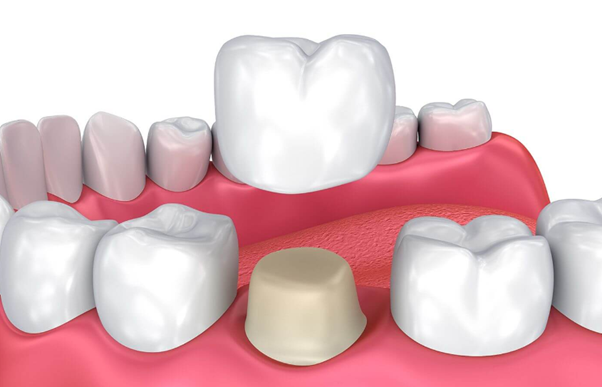
Dental crowns are one of the most effective solutions for restoring and protecting weak or damaged teeth. With their ability to improve functionality, enhance aesthetics, and offer long-lasting results, these crowns have become a go-to option for individuals with various oral health needs. However, before undergoing the procedure, individuals must understand the advantages and considerations associated with these crowns.
This article will explore the benefits of these crowns, such as their restorative properties, enhanced aesthetics, and improved oral health. It will also discuss the factors individuals should consider before undergoing the procedure, such as the preparation process, materials used, potential risks and complications, cost, and lifestyle factors.
Advantages of Dental Crowns
- Restorative Benefits: Dental crowns provide significant restorative benefits to individuals with damaged or weakened teeth. They are designed to cover the entire tooth structure, creating a protective layer that restores functionality to the tooth. Crowns can effectively treat teeth weakened by decay, fractures, and root canal treatments. Through crown placement, individuals can enjoy improved chewing and eating habits without experiencing sensitivity or further damage to the tooth.
- Aesthetics: They offer significant aesthetic improvements by enhancing the appearance of natural teeth. They are designed to match the colour and shape of the surrounding teeth, creating a uniform look. Crowns are effective in covering discolorations, chips, cracks, or misaligned teeth, giving individuals a confident and attractive smile.
- Durability and Longevity: These crowns are known for their durability and longevity, providing a long-term solution for tooth restoration. They can withstand the pressures of daily biting and chewing, ensuring that they can serve their purpose without significant wear or damage over the years. With proper care and regular dental check-ups, these crowns can last for many years, reducing the need for frequent repairs or replacements.
- Improved Oral Health: They can significantly improve oral health by reducing the risk of tooth decay or infections in weakened teeth. By placing a dental crown, individuals can avoid further damage to the tooth, preventing the need for more involved dental procedures.
Considerations for Dental Crowns
- Preparation Process: Considerable preparation is required before dental crowns can be placed. This process typically involves reshaping or reducing the affected tooth to accommodate the crown properly. Individuals may also receive a temporary crown while the permanent crown is being fabricated in a dental laboratory.
- Materials and Types: These crowns can be made from various materials, including ceramic, porcelain-fused-to-metal, and metal alloys, each with unique advantages and considerations. The choice of material can impact the aesthetics and longevity of the crown. Individuals should discuss their specific preferences, aesthetic goals, and concerns with their dentist to determine the most suitable type of crown for their needs.
- Potential Risks and Complications: Individuals should be aware of potential risks and complications associated with these crowns, although these are rare. Some individuals may experience sensitivity to hot or cold temperatures after receiving a crown, which typically subsides over time. If any complications arise, individuals should consult their dentist immediately to minimise the potential impact on oral health.
- Cost Considerations: The cost of these crowns varies depending on the materials used, the complexity of the procedure, and other factors. Individuals should inquire about the cost of the procedure, the financial options available, and whether dental insurance covers all or part of the expenses.
Consultation and Decision-making
Before undergoing a dental crown procedure, it is essential to consult with a dentist to assess oral health and determine suitability for crowns. A dental professional will evaluate the condition of the teeth, gums, and surrounding structures to ensure that crowns are the appropriate treatment option. During the consultation, individuals should discuss their specific goals, concerns, and expectations regarding crowns to facilitate a personalised treatment plan that aligns with their needs.
Several factors should be considered in the decision-making process for crowns. Cost considerations and insurance coverage play a significant role in determining the feasibility of getting crowns. Individuals should inquire about the cost of the procedure, any financing options available, and whether their dental insurance covers all or part of the expenses. Personal preferences, lifestyle factors, and aesthetic goals should also be taken into account when deciding on these crowns. By weighing these factors carefully, individuals can make informed decisions that are in line with their oral health and overall well-being.
Conclusion
In conclusion, exploring the advantages and considerations of dental crowns provides valuable insights into this common dental procedure and its impact on oral health. They offer numerous benefits, including restorative properties, aesthetic enhancements, and durability, making them a popular choice for tooth restoration. However, individuals should carefully consider the preparation process, materials used, and potential risks associated with these crowns before undergoing treatment.
Consulting with a dentist is crucial for assessing oral health and determining the suitability of these crowns. By discussing goals, concerns, and preferences with a dental professional, individuals can receive personalised care that meets their specific needs. Factors such as cost considerations, insurance coverage, and lifestyle preferences should also be taken into consideration when deciding on these crowns. Making informed decisions about these crowns ensures that individuals can maintain optimal oral health and achieve a beautiful and functional smile for years to come.

